Brian Clegg's Blog, page 118
May 30, 2013
Think before opening mouth
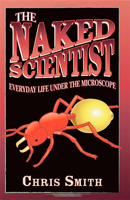 As someone who is passionate about science communication, I am all in favour of any means that can get information about science out to the general public. Scientists often criticize science journalists for being too simplistic, but I can testify to the ease with which an over-simplified explanation slips out when you are in a radio studio, being interviewed by a jolly breakfast DJ who hasn't a clue about science and, to be honest, hasn't much interest. It is natural to highlight the sexy aspects of the science and inevitably to distort the picture.
As someone who is passionate about science communication, I am all in favour of any means that can get information about science out to the general public. Scientists often criticize science journalists for being too simplistic, but I can testify to the ease with which an over-simplified explanation slips out when you are in a radio studio, being interviewed by a jolly breakfast DJ who hasn't a clue about science and, to be honest, hasn't much interest. It is natural to highlight the sexy aspects of the science and inevitably to distort the picture.The same temptation occurs when writing about science, but at least then there is the opportunity to take a step back and think about what it is that you are saying. However there is always a difficult balance to be made between making a subject approachable and capturing the science accurately.
There is another sin of science communication, though, which strangely scientists are just as prone to as science writers - and that is drawing unnecessary conclusions.
I found a great example of this in a piece in Chris Smith's Naked Scientist book, which consists of Smith's short write-ups of really interesting scientific papers. The example in question comes in a piece on the discovery of complex planetary system around the star 55 Cancri, about 41 light years from Earth. It was already known this had four gas giant sized planets, mostly occupying the space that rocky planets take up in our solar system (one is so close to the star that it orbits every 2.8 days).
The paper in Astrophysical Journal (back in 2008) described a fifth planet, in a 260 day orbit (so roughly positioned like Venus), at least 45 times the size of Earth - which made 55 Cancri's the largest planetary system that had been identified. So far, so interesting and uncontroversial. But the piece ends with a quote from co-discoverer Geoff Marcy. It's not clear if this is in the journal or whether Chris Smith interviewed Marcy, but either way the remark is a classic of what not to say. Marcy remarked 'We now know that our Sun and its family of planets is not unusual.'
The implications of this statement are a) this system is like ours and b) there are lots of them out there. But what are the facts? Admittedly 55 Cancri is not dissimilar to the Sun, but this is a system with five planets discovered, all of them vastly bigger than Earth, and with the closest three in 2.8, 14 and 44 day orbits - extremely tightly packed around the star. (Compare Mercury's 88 day orbit.) So not at all like the solar system. And discovering one other example doesn't make something is not unusual. We think there are billions of planetary systems in our galaxy. This deduction is made from two of them. Two points, it has been observed, do not provide any information on a graph.
You might argue that everyone has the facts, so will be aware this is a dramatic exaggeration. But when an expert makes a pronouncement like this it is those words that get picked up on, not the detail. There's some pressure at the moment for scientists to make more effort to communicate directly to the public. And that's fine. But they need to be trained to think as carefully about their public pronunciations as they do about their peer reviewed publications.
Published on May 30, 2013 01:11
May 29, 2013
A little competition is a good thing
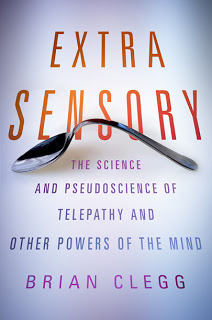 To celebrate my newest book
Extra Sensory
's arrival I am arranging a little giveaway with a 1 in 4 chance of winning.
To celebrate my newest book
Extra Sensory
's arrival I am arranging a little giveaway with a 1 in 4 chance of winning.We'd all love to have 'psi' abilities like telepathy, telekinesis, and remote viewing. But is there any solid evidence to back up these talents, or are they nothing more than fantasy? That's what Extra Sensory is about.
We still only understand a small percentage of the capabilities of the human brain—and we shouldn’t dismiss such potential powers out of hand. Although there is no doubt that many who claim these abilities are frauds, and no one has yet won James Randi’s $1M prize for demonstrating ESP under lab conditions, we still have a Nobel prize winner suggesting a mechanism for telepathy, serious scientists researching the field and university projects that produced potentially explosive results.
What’s the verdict? By looking at possible physical mechanisms for ESP and taking in the best scientific evidence, the reader can discover if this is all wishful thinking and deception, or a fascinating reality.
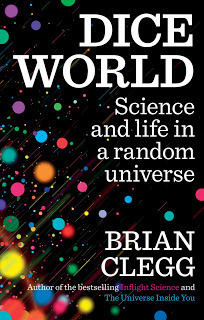 If that sounds interesting and you fancy a copy, then buy either a paper book or a Kindle version from Amazon via my Extra Sensory page between now and 12 June and you can win a signed copy of one of my other books. If it's not up your street, the same offer applies to my other recent book
Dice World
.
If that sounds interesting and you fancy a copy, then buy either a paper book or a Kindle version from Amazon via my Extra Sensory page between now and 12 June and you can win a signed copy of one of my other books. If it's not up your street, the same offer applies to my other recent book
Dice World
.In Dice World, we take an incredible trip around our random universe, uncovering the truths and lies behind probability and statistics, explaining how chaotic intervention is behind every great success in business, and demonstrating the possibilities quantum mechanics has given us for creating unbreakable ciphers and undergoing teleportation. Along the way we meet Maxwell's demon and Schrödinger's cat, and an experiment involving a mug, a golden retriever and the most controversial theorem in probability. Again, buy either a paper book or a Kindle version from Amazon via my Dice World page and you can win a free signed copy of another book.
I'll pick a quarter of entrants as winners - a 1 in 4 chance of winning - and you can choose from:
Inflight ScienceThe Universe Inside YouHow to Build a Time MachineBefore the Big BangArgmageddon ScienceUpgrade MeGlobal Warming Survival KitThe God EffectLight YearsGravity(See www.brianclegg.net to find out more about the books on offer.)
All you have to do is drop me an email at brian@brianclegg.net if you buy a copy of Extra Sensory or Dice World from their pages on my website. No need to send proof of purchase unless you win. I'll email you on 12 June if you are a winner. Simples!
Published on May 29, 2013 02:11
May 28, 2013
Audio train spotters
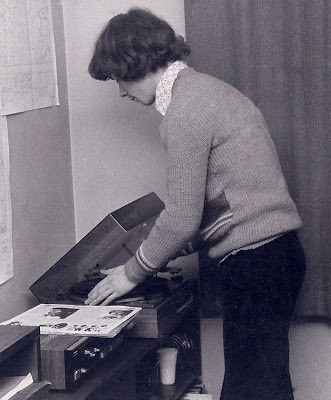 Me as a student being very careful with a vinyl record
Me as a student being very careful with a vinyl record (this was just before I bought my decent deck & amplifier)When I was a student I took my music reproduction seriously. While I couldn't afford top of the range equipment, I did eventually save up money from my holiday job to buy a nice record deck, and treated my vinyl collection like they were made of, well, vinyl. (You had to if you didn't want clicks, pops and bangs as you played them - remember that, folks.)
When CDs came along I heaved a sigh of relief. No more dust removal and clicks and pops. No more delicate handling. Clean, digital sound wherever and whenever I wanted.
Now I'm somewhat older and probably wiser I really don't give a monkey's about the quality of my sound system. When I was student I used to sit down and listen to music in a chair carefully positioned to get the best stereo placement. Now, to be honest, I don't sit and listen to music as a sole activity anymore. Ever. I have it on while I'm doing something like driving or boring admin or tidying up (I can't write with music on, it's too distracting), and as long as there's reasonable tone and volume I'm not particularly fussed about the perfection of reproduction quality. Frankly, I probably wouldn't notice if I had left and right channels reversed.
So I was a bit saddened to see in the excellent Observer last Sunday, in the same section as my piece on lightning, an article about some called Pete Hutchison who is bringing out new vinyl records that cost around £300 each. Hutchison is quoted as saying that digital music 'is the great con. They said that CDs were indestructible, but they weren't. They said it would sound better, but with the MP3 we are at probably the lowest point in the history of sound. It's a compressed file. If you try to play an orchestra over a proper sound system on MP3, it's just garbage.'
Now the first bit is just silly. The music industry did perhaps over-stress the robustness of CDs, for example showing how they could still be played after they got jam smeared on them. But you have to put this in the context that up to then we had lived with these nightmare vinyl discs that warped at the first sign on the sun, and that you only had to look at and they were coated in enough dust to make them sound like a bowl of Rice Crispies.
It is certainly arguable whether CDs or vinyl sounds better - and MP3s definitely are worse quality, because they are a compressed format. But again, a CD always sounds better than a vinyl record with lots of clicks and pops - which is pretty well every vinyl record, unless you dedicate all your spare time to keeping them pristine. And while it's true that in the early days, when storage was at a premium, people over-compressed MP3s and got fuzzy audio, at the kind of sample rate used these days, you have to be a real anorak of an audiophile to notice the difference.
Since most of us spend most of our time listening to music in the car or through earphones as we walk, or blaring out from a different room as we do the washing up, rather than in a dedicated music room with a perfectly positioned listening chair, let's face it, an MP3 usually works a lot better. Try playing vinyl in your car or on a record deck in a backpack and see where it gets you. And that's just the start of the convenience of MP3s in terms of being able to manage a huge library to great effect in a way that just wasn't possible with LPs. Instead of playing through a single LP at Christmas, for instance, I can pull up and randomize a playlist of 200 carols. Let's see you do that, Pete.
I much prefer to listen to my MP3s routed through my stereo amplifier and my Monitor Audio speakers. It is a vastly better sound than through earbuds or the computer's built in speakers. But taking that extra step of plugging a record deck in to get the final 3% improvement has very limited extra value for all normal listening. I'm sorry, Pete, but you are wrong - an orchestra sounds just fine from decent MP3s through a good system.
Don't get me wrong, as long as people want to buy Pete's products they are welcome to. It's not for me to say they can't, just that they are silly. The tiny minority who will are the trainspotters of audio, in the sense that they pursue something that has no value simply for the sake of the pursuit. They are people who are fanatically interested in the technology and the way it reproduces exact tonal qualities, rather than people who just enjoy listening to the music. One is tempted to say 'Get a life.' But it's probably too late for most of them.
Published on May 28, 2013 01:53
May 27, 2013
Zzap!
It being a public (bank) holiday here in the UK I am having a lazy day and simply referring you to my piece in yesterday's Observer newspaper on lightning. Enjoy!
Published on May 27, 2013 02:43
May 24, 2013
Wide Open Spaces
PCs and I go back a long way. My second PC at work, for instance, was IBM's AT model, of which I was privileged to have the second one that IBM imported into the UK (at least that's what they told me - they probably said that to all their customers). And it was a huge improvement on my previous XT, doubling the hard disk* space at a stroke to 20 Mb.
I tell you this, not so you can snigger at granddad, but to emphasise how things have moved on. In the early 1990s there was a huge business in software that automatically compressed files on your hard disk so you didn't run out of space. It slowed the computer down, but the introduction of music and photos was jamming up disk space terribly. But then something changed. Disks got really big. For my last few computers I've had more disk space that I knew what to do with. Let's take a look at what my computer has on offer and what I've used:
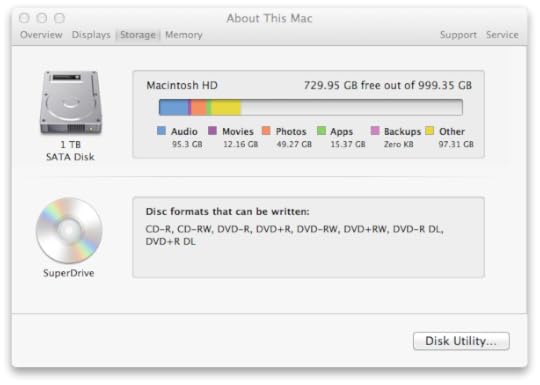 ... and that is keeping every email I send, every important one I receive, everything I've written since I started writing, lots of scanned documents, music, photos etc. etc. I've still got 73% free.
... and that is keeping every email I send, every important one I receive, everything I've written since I started writing, lots of scanned documents, music, photos etc. etc. I've still got 73% free.
The same thing is now happening online. I recently mentioned cloud backup services like Dropbox, Skydrive and Google Drive. But things are even more extreme with photo storage thanks to a breathtaking move from Yahoo. Where, for instance, Google's Google+/Picasa gives you a respectable 5 Gb free, Yahoo's Flickr has now started offering 1 Tb. A terabyte. 1,000,000,000,000 bytes (actually more than this as a Kb is really 1,024 bytes because computer scientists can't count, but let's not be fussy). That's as much space as my entire hard disk. Stunning or what?
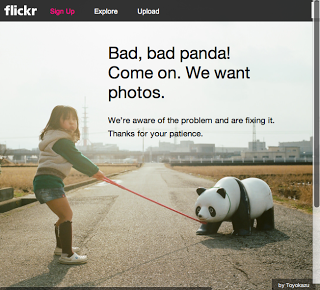
(At least, that's the theory. I suspect Flickr has been overwhelmed by people signing up, because when I just went to get a screenshot of my pathetic 100 Mb of photos in 1 Tb of space the image to the right is what came up.)
It has left me rather confused. I really don't know what to do now. I could now have all my photos for all my life available online, sharable how I like. It would take a long time to get them up there, but it would probably be worth it. Will I do it? I don't know. But I'm tempted. How about you?
*If anyone wants to point out to me as a British person I should spell this 'disc', the convention is in computing to use the likes of 'disk' and 'program' instead of the UK equivalent.
I tell you this, not so you can snigger at granddad, but to emphasise how things have moved on. In the early 1990s there was a huge business in software that automatically compressed files on your hard disk so you didn't run out of space. It slowed the computer down, but the introduction of music and photos was jamming up disk space terribly. But then something changed. Disks got really big. For my last few computers I've had more disk space that I knew what to do with. Let's take a look at what my computer has on offer and what I've used:
 ... and that is keeping every email I send, every important one I receive, everything I've written since I started writing, lots of scanned documents, music, photos etc. etc. I've still got 73% free.
... and that is keeping every email I send, every important one I receive, everything I've written since I started writing, lots of scanned documents, music, photos etc. etc. I've still got 73% free.The same thing is now happening online. I recently mentioned cloud backup services like Dropbox, Skydrive and Google Drive. But things are even more extreme with photo storage thanks to a breathtaking move from Yahoo. Where, for instance, Google's Google+/Picasa gives you a respectable 5 Gb free, Yahoo's Flickr has now started offering 1 Tb. A terabyte. 1,000,000,000,000 bytes (actually more than this as a Kb is really 1,024 bytes because computer scientists can't count, but let's not be fussy). That's as much space as my entire hard disk. Stunning or what?

(At least, that's the theory. I suspect Flickr has been overwhelmed by people signing up, because when I just went to get a screenshot of my pathetic 100 Mb of photos in 1 Tb of space the image to the right is what came up.)
It has left me rather confused. I really don't know what to do now. I could now have all my photos for all my life available online, sharable how I like. It would take a long time to get them up there, but it would probably be worth it. Will I do it? I don't know. But I'm tempted. How about you?
*If anyone wants to point out to me as a British person I should spell this 'disc', the convention is in computing to use the likes of 'disk' and 'program' instead of the UK equivalent.
Published on May 24, 2013 00:32
May 23, 2013
Addressing the bits we don't talk about
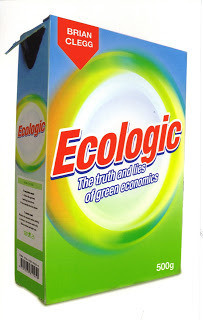 One of the joys of being a green heretic (TM) is that you are able to talk about the bits of ecological theory that traditionally aren't talked about. Because in most environmental issues there are topics that are considered off-limits, either because they result in bad publicity or are considered politically incorrect.
One of the joys of being a green heretic (TM) is that you are able to talk about the bits of ecological theory that traditionally aren't talked about. Because in most environmental issues there are topics that are considered off-limits, either because they result in bad publicity or are considered politically incorrect.Yesterday a small one of these reared its head on our local radio show. The excellent host Mark O'Donnell was talking about the recent report showing a major decline in some wild species in the UK. I pointed out that one way to improve things was to get rid of cats, as they kill at least 50 million wild birds a year. I was expecting a deluge of complaint from cat-lovers, but even when Mark expanded this to point out that over 300 million wild birds and mammals killed by cats each year, most of the response was in support of reducing the cat population. But despite his personal support, it was also interesting that Mark treated the cat aspect as a humorous adjunct, the sort of skateboarding duck of the item. When he spoke to two experts about what we should do, in neither case did he mention the cats.
The fact is that the impact of cats isn't a joke, it is a real contributory factor to species decline and we need to consider which is more important, the need for cats to roam or the survival of our wild species. It is not ideal for the cat, but it is perfectly possible for a cat to be an animal that isn't allowed to roam wild, like a dog - it only takes a change in attitude in society. (And, as a bonus, those of us without cats would get our lawns covered in cat poo.)
This is a relatively minor example, but there are plenty of others we sweep under the carpet. The biggest by far is the impact of human population growth on the environment. The fact is that when we talk about global warming or our consumption of natural resources, the human population size is a fundamental variable. Admittedly it is difficult to do anything about it, which is part of the reason why it is usually treated as the elephant in the room. Adopting something like China's one child policy is not the answer and is not compatible with most ideas of democracy. But what we certainly should be doing is countering cultural and religious arguments that result in large families that are unnecessary in a modern civilization where so many children survive. It is time, for instance, for environmental lobbies to take on medieval attitudes to contraception and to consider education to encourage smaller families to be as important as setting up nature reserves to preserve the habitat of the lesser spotted, swivel-eyed peewit.
This has been a Green Heretic production.
Published on May 23, 2013 00:46
May 22, 2013
The great East-West mint debate
 Like most people from the North West of England, I might grumble about the people of the North East, especially those from Yorkshire, but also have a grudging respect for them. However there is one subject that totally divides North East from North West. And that is mints.
Like most people from the North West of England, I might grumble about the people of the North East, especially those from Yorkshire, but also have a grudging respect for them. However there is one subject that totally divides North East from North West. And that is mints.Each of these great regions has a mint product they are deeply proud of. For us in the North West it is Uncle Joe's Mintballs. For the North East it is Black Bullets. Each comes proudly in a tin. Each is really rather a similar product (though slightly strangely, Black Bullets are more, erm, ball-shaped than Mintballs). They are brown, hard sweets with a strong mint flavour. I've never done a comparative taste test, but my suspicion is that they are very similar. Of course, Uncle Joe's are more sophisticated - they come in wrappers, where the Geordie equivalent is naked - but to be honest the sweet itself is much the same.

I have to grudgingly admit that having discovered they can be bought from Amazon we now tend to have the dreaded Black Bullets in the house, though while researching this piece I discover they also sell Mintballs, so we may see a change. After all, I'd rather they were Uncle Joe's, just on principle.
It's a bit like supporting the UK at the Eurovision Song Contest. It might just be a mint. It might not even be the best mint in the world. But it's our mint.
Published on May 22, 2013 00:33
May 21, 2013
Top twelve tips for brilliant customer service
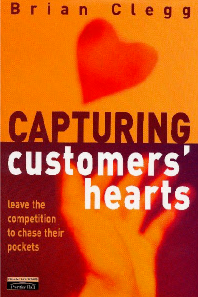 Although I don't write business books much these days, I am still passionate about creativity and customer service in business, and I thought it would be useful to occasionally throw in something from my customer service book,
Capturing Customers' Hearts
. I've called this 'top twelve tips' but really it's more the twelve aspects of customer service you need to focus on if you want your business to have charisma - to actually appeal to customers, rather than be somewhere they go because there's no other choice.
Although I don't write business books much these days, I am still passionate about creativity and customer service in business, and I thought it would be useful to occasionally throw in something from my customer service book,
Capturing Customers' Hearts
. I've called this 'top twelve tips' but really it's more the twelve aspects of customer service you need to focus on if you want your business to have charisma - to actually appeal to customers, rather than be somewhere they go because there's no other choice.1. Going the extra light year
In a way, this first component pulls all the others together. It’s an attractive trait if someone goes out of their way to help you. Equally it’s attractive if a company goes that extra mile. But for true charisma, to stand out like a beacon, you have to do more – to go the extra light year, the first component of capturing customers' hearts.
2. If it’s broke, fix it
We all get it wrong sometimes. Zero defect is a fantasy beloved of quality circles, but it is not a fact of human life. However good our systems and procedures and staff, things will go wrong – and then the customer measures the company's worth on how well we fix things. All too often, service recovery is grudging, set about with conditions and rules that make the hard-done-by customer feel like a criminal. If this is how you treat your customers, you are missing a huge opportunity for building up charisma.
3. I’m in love with my car
There are some products and brands that produce a reaction in the customer that is wildly disproportionate to their nominal value. It’s true of some cars, for instance, which have an almost fanatical following. Often these aren’t the best products by any conventional measure – instead they have a certain quirkiness that seems to generate such affection. You can’t engineer a product to be charismatic, but you can encourage it in that direction – and make sure that you maintain the benefit once you have a product that has achieved this status.
4. They know me
The whole field of Customer Relationship Management (CRM) has built up around the thesis that you can give customers a better experience if you know about them and make use of that knowledge in the way you serve them. Unfortunately, all too often, CRM has been driven by systems (and systems manufacturers) rather than the realities of human relationships. But this shouldn’t be allowed to cloud the reality that the company that really makes the customer feel recognized and welcome has a big stake in the charisma game.
5. Star power
Companies who don’t have a star figurehead tend to be cynical about those who do. The key figures (think Richard Branson) are regarded as unrepentant self-publicists for whom the limelight is more important than the success of the business. Yet this overlooks the fact that the public like a recognizable human face for a company. You can’t identify with a corporation – you can with a famous chief executive. For that matter, you can with any famous employee (remember the Halifax's Howard?) – or maybe the whole team. Perhaps everyone can be a star.
6. They’re people like us
As a gross generalization, people like people. They like dealing with real people. They have relationships with real people, not with companies. So the more it is possible to make your customer contact staff into real people, the better. That means staff who behave like people, not like automata. It means real people with real enthusiasms – especially those that are shared with the customers. And it means people we have to trust to get it right. There can be no charisma from staff in a strait jacket.
7. Surprise, surprise!
Dullness and charisma don’t go together. Once upon a time, consistency was a customer service god, but if everything is the same, if everything is predictable, there can be no excitement, no charisma. The element of surprise, provided it is a pleasant surprise is a key component to keeping your customers intrigued and coming back for more. Don’t bore them until they run over to the competition – keep the creativity and fun flowing.
8. Technical wizardry
It’s often said that men don’t really grow up – they remain enthralled by toys for their whole life. Whether your customers are men or women, technical flair will appeal to their male side. Sometimes charisma needs a little gloss – used correctly, technical polish is a valuable addition. Technology needs to be optional – some customers are turned off by it – but for many it is an effective attractor.
9. They’re mine, all mine
To call someone parochial is usually an insult, and yet we all have a degree of positive parochialism. It doesn’t matter if it’s my town, my country or my football team – we like to see our own do well. The more we can bring customers to feel that they own the company, the more they will feel inseparable from the company and its fortunes. Make the company theirs and loyalty is no longer an issue – it’s a fait accompli.
10. Cute and cuddly
If technology appeals to the male in us all, there’s something about being cute and cuddly that tugs at our female side. To be charismatic is not necessarily to be loveable, but companies that give their customers that warm glow are inevitably charismatic.
11. We keep in touch
Communication is at the heart of human relationships and is equally important in fostering the relationship between a human being and a company. So often the things that go wrong are a result of a breakdown in communications. Keeping up a dialogue and making it obvious that you enjoy that communication makes it difficult for a customer to resist. You should never let up on communications.
12. The twelfth component
That’s eleven out of the way, but what of the twelfth? I have to confess that consideration of a twelfth component arose initially out of a sense of order. There’s something lumpy and unsatisfactory about the number eleven, compared to the serried order of twelve. When I began to think about what a twelfth component could be, I realised it was just as well that I had undertaken the exercise, because I had missed something big. Most people would accept that some companies have attributes that make the unique. What I came to realize, however, is that this statement can be generalized. Every company has its unique attributes, and these form the twelfth component that can bring charisma.
Published on May 21, 2013 00:03
May 20, 2013
Liquid gold
This is one for the Mac users amongst you (or those with secret Mac cravings) - I have fallen in love with a little app called Liquid.
One of the biggest surprise when you come into the Mac world from the outside is how obsessed the heavy-duty Maccers are with doing things with keyboard shortcuts. Given that the Mac popularised the mouse, it's rather amusing that Macfans just love to do as much as possible without ever taking their hands off the keyboard. Now this works quite well for me - in Windows, I always used to cut and paste using keystrokes, for instance. But when it comes to the Mac much more seems frequently done this way, and there are plenty of helper apps like Alfred to extend the possibilities.
Liquid is a productivity tool for people who often look things up - ideal for a writer. Let's say I'm writing about Jupiter and wanted to check a fact in Wikipedia (yes, it is possible to do this - the science coverage is usually very good). I've just typed Jupiter in Word (say). All I do is highlight the word Jupiter and hit Liquid's activating key combination followed by RW (short for Reference Wikipedia). Zippo zappo and Wikipedia opens on the page for Jupiter.
 At the point I've typed Cmd-§R but not the W for Wikipedia
At the point I've typed Cmd-§R but not the W for Wikipedia
I can equally look things up in (say) a dictionary or Wolfram Alpha, can search the likes of Amazon and Google or can do an instant conversion, say from Celsius to Fahrenheit (something I do quite frequently). This takes a few more key presses, but it's still just select, activate keypress then C(onvert) T(emperature) C(elsius) F(ahrenheit).
It is brilliant. All that I have described so far is in the free version, but I've gone for the paid for 'Pro' version, partly because I think it is worth £2.99 and only fair to pay for it, and partly because this adds translations and the ability to include your own searches. So, for instance, I can now search Amazon.co.uk as well as Amazon.com, can reference the full OED, which I have online access to, rather than the the cut down dictionary, and can make use of my own www.popularscience.co.uk site (or this one).
The app's not perfect - in fact it can be rather frustrating. The default key press is Cmd-@ (for Windows users, Cmd is the equivalent of Ctrl in keyboard shortcuts). But @ is a shifted character, so it takes three fingers to do. I have switched this to Cmd-§, which is just two keys, so practical with one hand. But changing the setting isn't as easy as you might think, as you have to do it in the Mac's services control panel, as Liquid has to act at a low level to intercept keypresses. The other irritation is that occasionally the key press does nothing, and occasionally the text you highlight isn't copied into the app. You can still type what you are searching for, either calling up the app with the keypress or using its little toolbar thingy - and sometimes that is better because you might not have typed the text you want to look up - but it is a real pain when it doesn't work, as to be efficient, you want to type the control keys without needing to check the word has passed through.
Despite these minor moans, though, it's a real winner.
One of the biggest surprise when you come into the Mac world from the outside is how obsessed the heavy-duty Maccers are with doing things with keyboard shortcuts. Given that the Mac popularised the mouse, it's rather amusing that Macfans just love to do as much as possible without ever taking their hands off the keyboard. Now this works quite well for me - in Windows, I always used to cut and paste using keystrokes, for instance. But when it comes to the Mac much more seems frequently done this way, and there are plenty of helper apps like Alfred to extend the possibilities.
Liquid is a productivity tool for people who often look things up - ideal for a writer. Let's say I'm writing about Jupiter and wanted to check a fact in Wikipedia (yes, it is possible to do this - the science coverage is usually very good). I've just typed Jupiter in Word (say). All I do is highlight the word Jupiter and hit Liquid's activating key combination followed by RW (short for Reference Wikipedia). Zippo zappo and Wikipedia opens on the page for Jupiter.
 At the point I've typed Cmd-§R but not the W for Wikipedia
At the point I've typed Cmd-§R but not the W for WikipediaI can equally look things up in (say) a dictionary or Wolfram Alpha, can search the likes of Amazon and Google or can do an instant conversion, say from Celsius to Fahrenheit (something I do quite frequently). This takes a few more key presses, but it's still just select, activate keypress then C(onvert) T(emperature) C(elsius) F(ahrenheit).
It is brilliant. All that I have described so far is in the free version, but I've gone for the paid for 'Pro' version, partly because I think it is worth £2.99 and only fair to pay for it, and partly because this adds translations and the ability to include your own searches. So, for instance, I can now search Amazon.co.uk as well as Amazon.com, can reference the full OED, which I have online access to, rather than the the cut down dictionary, and can make use of my own www.popularscience.co.uk site (or this one).
The app's not perfect - in fact it can be rather frustrating. The default key press is Cmd-@ (for Windows users, Cmd is the equivalent of Ctrl in keyboard shortcuts). But @ is a shifted character, so it takes three fingers to do. I have switched this to Cmd-§, which is just two keys, so practical with one hand. But changing the setting isn't as easy as you might think, as you have to do it in the Mac's services control panel, as Liquid has to act at a low level to intercept keypresses. The other irritation is that occasionally the key press does nothing, and occasionally the text you highlight isn't copied into the app. You can still type what you are searching for, either calling up the app with the keypress or using its little toolbar thingy - and sometimes that is better because you might not have typed the text you want to look up - but it is a real pain when it doesn't work, as to be efficient, you want to type the control keys without needing to check the word has passed through.
Despite these minor moans, though, it's a real winner.
Published on May 20, 2013 01:08
May 17, 2013
E-volution
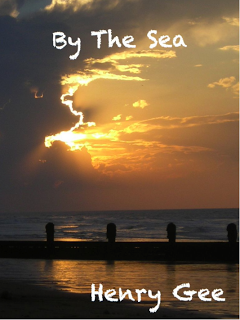 If you have a Kindle (or a device you can read a Kindle book on like an iPad, or Android tablet, or smartphone or PC or Mac... you get the picture) today is a momentous day as between now and 21 May, to celebrate the Cromer and Sheringham Crab and Lobster Fest (I kid you not), my friend Henry Gee's dark and gothic crime mystery By the Sea is free! (Check it out at Amazon.co.uk or Amazon.com.)
If you have a Kindle (or a device you can read a Kindle book on like an iPad, or Android tablet, or smartphone or PC or Mac... you get the picture) today is a momentous day as between now and 21 May, to celebrate the Cromer and Sheringham Crab and Lobster Fest (I kid you not), my friend Henry Gee's dark and gothic crime mystery By the Sea is free! (Check it out at Amazon.co.uk or Amazon.com.)It's worth writing this post just to tell you this. I mean, it has a creepy museum with a preserved mermaid! However I did have a larger point. I will be rushing to download a copy to my iPad... and yet I have already bought the real, paper version. Why would I do this? I think it represents a fundamental shift. My life is getting cloudy.
It's not that I'm abandoning paper books, but if I can have a book available in e-format as well, I will - because then if I want to look at it and I'm not at home I can do it, just like that. My library is heading cloudward.
The same thing is happening with music - I still sometimes buy CDs, but immediately slam them into iTunes. It's the same with photos. Nowadays if I take a photo it will be native in electronic format, but I am also going through a lengthy programme of scanning my old hard copy pictures. In fact the scanner is getting quite a hammering, as any documents I get in physical format that may be useful go straight into the scanner and via a nifty little app are transferred to PDF and hoovered up by Evernote - which then means I can access them wherever I want, whenever I want.
So don't look at getting a Kindle version of a book as neglecting the old paper friends. You can still keep your hard copies - but consider it a widening of your horizons. How else could you decide at a moment's notice to read about a pickled mermaid for free?
Published on May 17, 2013 00:48



